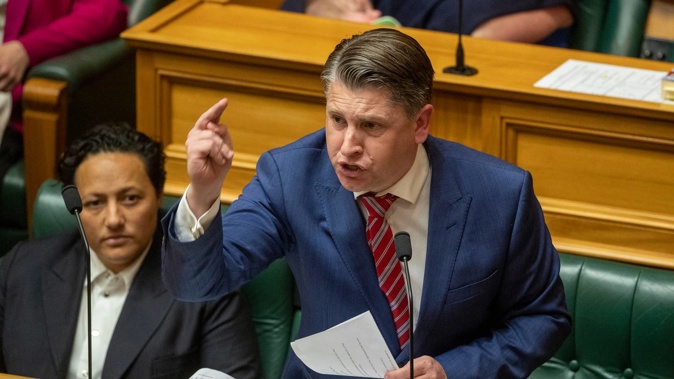
One of Labour's flagship worker policies has passed in a fiery debate in front of a gallery packed with jubilant unionists, marking one of the most significant shifts in employment relations in decades.
But it was not without contention, as National and Act vehemently opposed the Fair Pay Agreements Bill they likened to "compulsory unionism" and vowed to repeal it.
Opposition MPs fought tooth and nail to slow its passage - their sole tool with a Labour majority - drawing out the committee stage over 13 hours, as impassioned speeches from each side were consistently interrupted in a heated fashion.
In the end the law, which will make it easier for workers to band together to negotiate wages and working conditions, became reality as hundreds in gallery erupted into the waiata Tūtira Mai Ngā Iwi.
Earlier the gallery energy threatened to boil over, attendees twice having to be warned by Second Assistant Speaker Jacqui Dean to keep their silence until the debate ended when they could "applaud as wildly as you care".
/cloudfront-ap-southeast-2.images.arcpublishing.com/nzme/F6NFI4KQQBB3ZH5UROEWC3NXKA.jpg) Workplace Relations Minister Michael Wood with unions outside Parliament ahead of Fair Pay Agreements legislation passing. Photo / Michael Neilson
Workplace Relations Minister Michael Wood with unions outside Parliament ahead of Fair Pay Agreements legislation passing. Photo / Michael Neilson
Workplace Relations Minister Michael Wood said the bill was a step towards reversing the "radical deregulation of the labour market" 30 years ago when a then-National government stripped back collective worker rights through the Employment Contracts Act.
At the time National MPs claimed productivity and wages would improve, which Wood said had not eventuated.
"The promises that they made in that funk of deregulation, that they still live in a fever dream of, were proven to be false."
Wood said the legislation was about supporting the most vulnerable workers, including the essential workers who'd "kept us safe through Covid-19".
- Peters' message to unions: Attacking the Govt won't work
- CTU President and Business NZ Chief Executive discuss Fair Pay Agreements
- Fair Pay Agreements legislation expected to pass third reading in Parliament
It would stop a "race to the bottom", where lacking adequate regulation employers were inclined to drive wages and conditions down to stay competitive.
Wood, as with other Labour MPs, also paid tribute to the late union leader Helen Kelly, saying the law invoked her "most important values and contributions".
"That was the value that we are better off when we are together when we bring everyone to the table, including working people."
Acting Prime Minister Grant Robertson said the 1991 changes and reduction in wages were "not by accident, but by design".
"Today we turn that around," he said, to loud cheers from the Labour caucus.
Robertson said it was not a bad law for good employers, who would no longer be forced to drive their wages and worker conditions down to stay competitive.
"This is a day for employers to celebrate just as much as employees."
There were also personal anecdotes shared, with Labour's Meka Whaitiri from a "long line of freezing workers" speaking emotionally about how the 1991 reforms affected her town of Whakatū. It was once full of jobs and where everyone owned their own homes.
"It devastated the very community I lived in and come from," she said, her voice breaking.
As MPs spoke in support, National and Act MPs jeered and heckled with claims including unions had "destroyed our economy" and accusations of "old-fashioned socialism".
/cloudfront-ap-southeast-2.images.arcpublishing.com/nzme/2XGTDGC3I5XIBEOGCILE5GGV5A.jpg) Minister of Workplace Relations and Safety Michael Wood said since the deregulations of 1991 productivity had risen but wages had not kept up. Photo / Mark Mitchell
Minister of Workplace Relations and Safety Michael Wood said since the deregulations of 1991 productivity had risen but wages had not kept up. Photo / Mark Mitchell
Conversely, Labour and Green MPs returned fire as the conservative politicians argued their cases.
"It's the 1980s talking," called out Green MP Chloe Swarbrick as National's Scott Simpson spoke,
"Who has had the benefits?" she asked, in response to his claims the 1991 employment changes had been effective.
National Party workplace relations and safety spokesman Paul Goldsmith in an impassioned speech said there was "not a person in the country who did not want higher wages" but they had to be "sustainable".
He said the only way to higher wages was through a productive economy, which he argued the FPAs would "harm".
"Fair Pay Agreements will make New Zealand's workplaces less agile and flexible and make all workers beholden to a union agenda.
"It will force employers and workers within a sector to bargain for minimum terms and conditions for all employees in that industry or occupation, regardless of whether or not they want to be included."
FPAs will overhaul employment law, making it far easier for workers to collectively negotiate with employers, and creating sector-wide awards determining pay and conditions for workers.
Under the law, unions could begin a negotiation if they got support from 1000 workers who would be covered by the agreement, 10 per cent of a workforce, or meet a public interest test.
People do not need to be union members to count towards those tests, and they do not need to join a union to be covered by an FPA.
Act Party small business spokesman Chris Baillie said the bill would take away the rights of workers to "plan their own destiny".
He said the criteria meant in some cases just 0.5 per cent of a sector could trigger an FPA.
Baillie put forward six amendments at the committee stage that each had to be debated and were ultimately shut down.
Green Party workplace relations and safety spokeswoman Jan Logie meanwhile threatened to sing and dance.
"This is truly a day to celebrate."
The legislation has been years in the making.
It came out of Labour's 2017 manifesto commitment, which was developed by a working group led by former National prime minister Jim Bolger.
Labour failed to get an FPA regime over the line in its first term after failing to win over coalition partner NZ First.
The heated debate had glimpses of another 22 years ago, when Helen Clark's Labour government repealed the 1991 Employment Contracts Act, replacing it with the Employment Relations Act.
That process involved 70 hours of debate in which 698 amendments had to be defeated.
The Fair Pay Agreements Bill passed its third reading today, with the support of Labour, the Green Party and Te Pāti Māori.
The bill ushering in a new era of employment relations passed by 76 votes (Labour, Greens, Te Pāti Māori) to 43 (National, Act).
Take your Radio, Podcasts and Music with you









